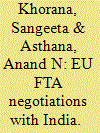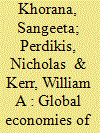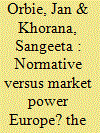|
|
|
Sort Order |
|
|
|
Items / Page
|
|
|
|
|
|
|
| Srl | Item |
| 1 |
ID:
185572


|
|
|
|
|
| Summary/Abstract |
Global trade governance is increasingly characterized by a growing fragility in multilateral institutions and a preference for bilateral negotiations. The literature on such negotiations focuses primarily on successful agreements. Academic research on unsuccessful or stalled bilateral talks is limited, although better understanding of such outcomes may provide lessons for future negotiations. This article contributes to such understanding by proposing a revised open economy politics (OEP) framework, adapted to ‘second generation’ OEP analysis. Our framework highlights the multidirectional linkages between the trinity of interests, institutions and international interactions within trade negotiations, while adding the role of power and ideas to the analysis. We leverage our revised framework to explore why the European Union–India Free Trade Agreement (EUIFTA) negotiations stalled, thus providing insights as negotiators seek to revive them. Drawing on 45 semi-structured interviews conducted over a seven-year period in the EU and India, we examine what impact these different factors had on the progress of talks. Our results suggest that our revised OEP approach provides a multi-layered and integrated framework which enables us to better understand negotiating outcomes. Furthermore, our findings suggest that the shifting balance between emerging economies and developed economies as a result of the geopolitical (power) shifts and ideational change will affect future trade negotiations.
|
|
|
|
|
|
|
|
|
|
|
|
|
|
|
|
| 2 |
ID:
134214


|
|
|
|
|
| Publication |
2014.
|
| Summary/Abstract |
The proposed bilateral free trade agreement (FTA) between India and the European Union has thrown up many contentious issues among which public procurement is an important one. While India is reluctant to include public procurement in FTA, the European Union (EU) has been insisting that FTA without liberalisation of public procurement is not on the negotiating table. What makes India particularly attractive to the EU is not only the size of its public procurement market but also its rapidly growing economy and demand for infrastructure which presents EU firms with an opportunity to gain market access into this sector under the FTA setting. The EU is insisting on national treatment and non-discrimination as also transparency in Indian procurement system. Indian companies aspire to crack open public procurement market in the EU by entering it through the services sector. However, they are finding EU procedures for 'data adequacy' and policies relating to work visa difficult. India's reluctance to negotiate government procurement under the FTA framework is also attributed partly to administrative costs required for making changes to existing framework and for establishing institutions to implement bilateral obligations. Though several deadlines have been missed, an agreement that could bring mutual benefit for both the EU and India is not out of reach.
|
|
|
|
|
|
|
|
|
|
|
|
|
|
|
|
| 3 |
ID:
137813


|
|
|
|
|
| Summary/Abstract |
Economies of scale are an alternative source of growth particularly at a time when countries are suffering from global economic malaise. The proposed EU-India free trade agreement holds substantial promise as this will create a combined market of over one and a half billion and generate economies of scale from intra-industry trade, which are likely to be concentrated in manufactured products such as chemicals, machinery and transport equipment. Bold action is needed on the part of politicians in both the EU and India to successfully negotiate the agreement given that this will enable both countries to reap the efficiency gains of global economies of scale, provide a significant competitive advantage over other major economies and deliver the necessary spur to shake both the EU and India out of their current economic stagnation.
|
|
|
|
|
|
|
|
|
|
|
|
|
|
|
|
| 4 |
ID:
148056


|
|
|
|
|
| Summary/Abstract |
International relations are in a state of dynamic transition, with the emergence of an assertive China, growing India and the United States (US) as main players in the Indian Ocean region (IOR). China’s increasing geopolitical influence (developed in the so-called String of Pearls theory) and assertiveness in the South China Seas, complemented by the US policy aimed at enhancing operational integration in the region has led India to realign and outline its strategic vision under Prime Minister Narendra Modi to play a significant role in the IOR. This Special Issue of JIOR fleshes out this theme and other related topical issues in the region, focussing in particular on the growing interplay between China, India and the US – the three pillars – that play an increasingly important role in the reconfiguration of geopolitics in the IOR.
|
|
|
|
|
|
|
|
|
|
|
|
|
|
|
|
| 5 |
ID:
151194


|
|
|
|
|
| Summary/Abstract |
Trade agreements are increasingly being negotiated between developed and emerging economy partners. An example is the EU–India Free Trade Agreement (FTA) for which negotiations began in 2007. There has been a debate on the potential effects of the proposed FTA and how this can impact on India’s key export sectors. Our study addresses this aspect from a global computable general equilibrium (CGE) modelling perspective. Using the Global Trade Analysis Project (GTAP) framework, we analyse trade and welfare impacts of the proposed FTA between the EU and India. Two scenarios are modelled: first, complete and immediate elimination of tariff on all goods traded and second, selective tariff elimination on textiles, wearing apparel and leather goods—products in which India has a comparative advantage. Results under both scenarios show that India enjoys positive welfare effects though there is a possibility of trade diversion. Under scenario 1, India loses due to a negative terms of trade (ToT) effect. Under scenario 2, with selective sectoral liberalisation, gains are mainly concentrated in the textiles, wearing apparel and leather sectors. There is a positive output effect from change in demand for factors of production, suggesting that the proposed FTA could lead to relocation of labour-intensive production to India.
|
|
|
|
|
|
|
|
|
|
|
|
|
|
|
|
| 6 |
ID:
144984


|
|
|
|
|
| Summary/Abstract |
The normative power Europe concept has greatly enriched the academic debate on what the EU is (should be), what it does (should do) and what impact it has (should have). However, various theoretical, methodological and empirical issues remain insufficiently addressed. This article will address two issues that have mostly been neglected: the perspective of the norm takers (in line with this special issue) and the market norms of the EU. The first section elaborates on these two issues, relying on recent advances in the literature and specifically the contributions by Damro (J Eur Publ Pol 19(5):682–699, 2012) and Rosamond (Brit J Polit Int Relat 16(1):133–148, 2013). Against this background, the second section examines the controversial EU trade negotiations with India. Specifically, this empirical part section focuses on how market liberal norms (government procurement) and cosmopolitan norms (human rights) are being promoted and received. We conclude that in the eyes of the EU, trade agreements could be a means to mitigate partners’ opposition and an eventual stepping stone for successful off-take of international social standards and multilateral procurement liberalization regulations by its partner countries. But, partner countries might not necessarily espouse the EU’s interest-led motivation and lend support to the EU’s desire to effuse multilateral norms through trading agreements. The case study on EU-India trade talks illustrates this, highlighting the divergence between the EU and Indian perspectives and demonstrates India’s lack of enthusiasm to adopt the EU’s preferred model for liberalization.
|
|
|
|
|
|
|
|
|
|
|
|
|
|
|
|
|
|
|
|
|